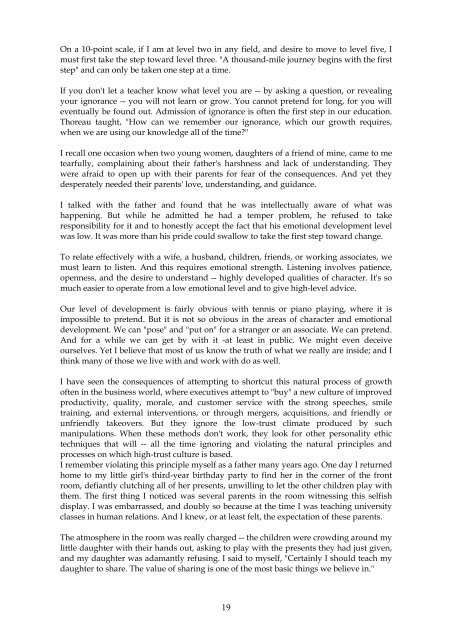Covey - The 7 habits of highly effective people
You also want an ePaper? Increase the reach of your titles
YUMPU automatically turns print PDFs into web optimized ePapers that Google loves.
On a 10-point scale, if I am at level two in any field, and desire to move to level five, I<br />
must first take the step toward level three. "A thousand-mile journey begins with the first<br />
step" and can only be taken one step at a time.<br />
If you don't let a teacher know what level you are -- by asking a question, or revealing<br />
your ignorance -- you will not learn or grow. You cannot pretend for long, for you will<br />
eventually be found out. Admission <strong>of</strong> ignorance is <strong>of</strong>ten the first step in our education.<br />
Thoreau taught, "How can we remember our ignorance, which our growth requires,<br />
when we are using our knowledge all <strong>of</strong> the time?"<br />
I recall one occasion when two young women, daughters <strong>of</strong> a friend <strong>of</strong> mine, came to me<br />
tearfully, complaining about their father's harshness and lack <strong>of</strong> understanding. <strong>The</strong>y<br />
were afraid to open up with their parents for fear <strong>of</strong> the consequences. And yet they<br />
desperately needed their parents' love, understanding, and guidance.<br />
I talked with the father and found that he was intellectually aware <strong>of</strong> what was<br />
happening. But while he admitted he had a temper problem, he refused to take<br />
responsibility for it and to honestly accept the fact that his emotional development level<br />
was low. It was more than his pride could swallow to take the first step toward change.<br />
To relate <strong>effective</strong>ly with a wife, a husband, children, friends, or working associates, we<br />
must learn to listen. And this requires emotional strength. Listening involves patience,<br />
openness, and the desire to understand -- <strong>highly</strong> developed qualities <strong>of</strong> character. It's so<br />
much easier to operate from a low emotional level and to give high-level advice.<br />
Our level <strong>of</strong> development is fairly obvious with tennis or piano playing, where it is<br />
impossible to pretend. But it is not so obvious in the areas <strong>of</strong> character and emotional<br />
development. We can "pose" and "put on" for a stranger or an associate. We can pretend.<br />
And for a while we can get by with it -at least in public. We might even deceive<br />
ourselves. Yet I believe that most <strong>of</strong> us know the truth <strong>of</strong> what we really are inside; and I<br />
think many <strong>of</strong> those we live with and work with do as well.<br />
I have seen the consequences <strong>of</strong> attempting to shortcut this natural process <strong>of</strong> growth<br />
<strong>of</strong>ten in the business world, where executives attempt to "buy" a new culture <strong>of</strong> improved<br />
productivity, quality, morale, and customer service with the strong speeches, smile<br />
training, and external interventions, or through mergers, acquisitions, and friendly or<br />
unfriendly takeovers. But they ignore the low-trust climate produced by such<br />
manipulations. When these methods don't work, they look for other personality ethic<br />
techniques that will -- all the time ignoring and violating the natural principles and<br />
processes on which high-trust culture is based.<br />
I remember violating this principle myself as a father many years ago. One day I returned<br />
home to my little girl's third-year birthday party to find her in the corner <strong>of</strong> the front<br />
room, defiantly clutching all <strong>of</strong> her presents, unwilling to let the other children play with<br />
them. <strong>The</strong> first thing I noticed was several parents in the room witnessing this selfish<br />
display. I was embarrassed, and doubly so because at the time I was teaching university<br />
classes in human relations. And I knew, or at least felt, the expectation <strong>of</strong> these parents.<br />
<strong>The</strong> atmosphere in the room was really charged -- the children were crowding around my<br />
little daughter with their hands out, asking to play with the presents they had just given,<br />
and my daughter was adamantly refusing. I said to myself, "Certainly I should teach my<br />
daughter to share. <strong>The</strong> value <strong>of</strong> sharing is one <strong>of</strong> the most basic things we believe in."<br />
19


